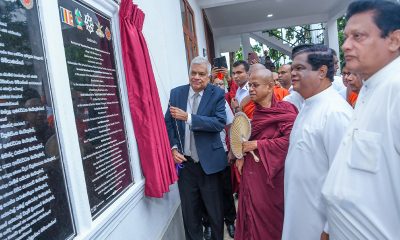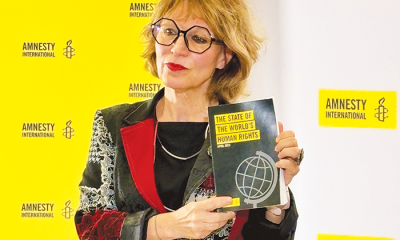Features
Buddhism and Buddhists: Ageing inevitable, not weakness

 This Friday Cassandra is on a very different tack or track. No dealing with politics; no criticism of politicians; no harping on the fate that befell our splendorous island and no mention of those who sent us down the pallang on account of their self-centeredness, huge hubris, power craze, corruption and lack of administrative ability. Why, you may query.
This Friday Cassandra is on a very different tack or track. No dealing with politics; no criticism of politicians; no harping on the fate that befell our splendorous island and no mention of those who sent us down the pallang on account of their self-centeredness, huge hubris, power craze, corruption and lack of administrative ability. Why, you may query.
Does Cass think things are now hunky-dory; the economy is back on track and politicians have become honest, sensible and intelligent, even though short of being statesmen? Definitely not! The reason is that leopards don’t change their spots; dogs do not rid themselves of ticks, wayward children continue being stubbornly wayward. So, Cass decided to entertain her readers this Friday instead of adding fuel to their anger and frustration. She intends narrating a personal experience, which might annoy some stern Buddhists, but if Cass shoots shafts at powerful politicians, what is it to irritate a couple of Buddhists who we hope have metta within them. The second part of her article is mainly for the older women who read Cass’s Cry on Fridays.
New and now Buddhism
Got a dose of this on Saturday 4 November. Cass went to the Maitreya Hall in the premises of the Mettarama Temple in Bambalapitiya to listen to Ven Vajiraramaye Nanasiha Thera address the Servants of the Buddha and others. These Saturday talks have a long and almost unbroken history from the time of the inception of the Servants of the Buddha Society of devout Buddhists in 1921 founded by Dr Cassius Perera, assisted by W J Soysa, W A de Silva and Justice Hema Basnayake. Dr Cassius Perera later was ordained and took the name Kasssapa Thera. His granddaughter was present on the Saturday event I write about, having arrived from Australia.
Ven Nanasiha Thera spoke into a microphone but it was not loud and his voice may not have gone beyond the hall we were in. I was in the middle of the hall and soon was disturbed by an echo. Looking around I saw that a man across the aisle was listening to his cell phone, later explained to me by the possibility of listening via Bluetooth or whatever. This person could have moved away from being in proximity to others present. He would have heard the Ven Thera’s talk on his cell phone even from the back of the hall, not disturbing others.
Then midway in the Ven Thera’s talk a loudspeaker bana preaching in Sinhalese began in the hall of the temple. There was no possibility of hearing what Ven Nanasiha was saying. Here arose a question in Cass’ mind. The Maitreya Hall meeting of the Servants of the Buddha is on Saturdays starting at 4.30 pm, from way back, maybe for more than a hundred years. The temple monks know this.
So, could not the usual Bodhi pooja of the temple have been delayed somewhat on a Saturday, or the bana not amplified so loud? Cannot there be dialogue and a fitting in of two programmes so they do not clash? Looking into the bana maduwa Cass noticed only about 15 devotees listening to the bana in Sinhala. The temple monk would surely have been heard very well without the amplifier system. But no, that is the new trend of broadcasting very loud (annoyingly to others) every temple pooja, pirith and bana.
This happens in the most sacred place in Anuradhapura: at the Sacred Bo Tree. A constant drone of chanting goes on as people pay the kapuralas to mediate between themselves and gods; the Buddha Himself (?); to grant them their wants. At frequent intervals the vihara amplifies its poojas. Silence and quiet to meditate seem out of the question here, which is what should prevail and be done by devotees.
I wrote of one devout Buddhist who was not considerate of his trying-hard –to-listen neighbours. The other was met as Cassandra moved to leave the premises. Her car was parked within the temple premises without blocking any others. Her driver too was keen to listen to Ven Nanasiha and so sat in the Maitreya Hall. Coming out with rain starting to fall, we found a car very inconsiderately parked blocking all others from leaving the temple premises. Cass’ driver asked around who the owner/driver of the offensively parked car was. No result. Cass too, in spite of the falling rain, asked around.
She felt she should enter the bana maduwa and enquire but did not want to intrude, though by now her disdain for inconsiderate Buddhists was high. After many apologies for preaching overtime the temple monk ceased his sermon which the driver said had no Buddhism in it at all except criticism of society in general. Then a man in trousers emerged from the verandah of the vihara ge and moved his car allowing Cass’s to proceed out. He heard the driver’s question, saw Cass’s anxiety to get her car out and took no notice until he could please himself about moving his car.
A very long tale but it amplifies what is happening to our religion of great consideration, kindness and concern for others; and some who profess they are Buddhists being only concerned about themselves. Cass makes bold to say the religion or way of life preached by the Buddha who went through much, even self-mortification, to show a way out of unsatisfactoriness in countless rounds of birth, is degraded now. And some who outwardly proclaim to be devout Buddhists have not got over selfishness and egotism.
Inspiring story of determination
Cassandra watched on Netflix the film Nyad. A review in the November 3 Washington Post written by Sally Jenkins starts by saying nature and age are in conflict with the two women protagonists. The characters they portray conquer the two elements, “not in some trite, scripted or airbrushed way but with the sinews and cartilage of real athletes. Every now and then a cultural moment comes along that exposes how severely and artificially we continue to limit the conceptual range of female ideals, and the cannonball biceps of these actresses in their un-camouflaged 60s constitute a significant one. Sun-scorched, straw-haired, scored with tendons, they are glorious.”
Nyad, directed by husband and wife Jimmy Chin and Elizabeth Chai Vasarhelyi, is the biopic of marathon swimmer Diana Nyad who culminated her swimming career and records held for long distance swimming in the open sea by completing the 119 mile swim from Cuba to Florida in 2013 at age 64 with the help of her closest friend and trainer, Bonnie Stoll. In Nyad the swimmer is played by Annette Bening (age 65) and her friend by Jodie Foster (60).
As Sally Jenkins comments: “But there is a story within a story in the film: the friendship of two women frustrated by a Hollywood culture that permits so few dynamic roles for mature women and who do something about it. When Nyad began filming in a 233 by 233 -oot tank of water in April 2022, Bening showed up on set with stunt doubles, whom she promptly rendered bystanders. Bening trained under an Olympic swimmer for more than a year for her role in the film, and swam all through the filming. This meant eight hours each day in water, and swimming.
Cassandra is not merely narrating stories this Friday morning. Using old fashioned jargon she says there is a moral or morals in the story. Yes, there are messages that should come through.
The two actresses mentioned above may have been on the shelf, because Hollywood definitely is young-age worshipping. Once one’s looks and glam figure are somewhat lost, one is shelved a discard not only in Hollywood but more so in Bollywood. It happens in societies too.
Mercifully, in Sri Lanka the Aachie/Athamma are respected and given a place in family hierarchies. The younger generation usually respects and loves the old biddies. The old have much to give of experientially gathered knowledge and accumulated wisdom.
Very importantly, the film shows there are no limits placed in the path of the older woman that cannot be broken through. It was determination, will power, confidence in self and the belief of friends that got the swimmer Diana Nyad swimming more than 100 miles in shark infested waters. She had confidence in herself and trust in her coach and her team.
We, though a small nation, boast our own intrepid women. Politically, Mrs B comes to mind. She started off naively, answering questions on her policy as that of her late husband’s. But she matured in politics and came to know people well, so much so that during the latter stages, she was considered to be the only man in her Cabinet of Ministers.
Consider petite Jayanthi Kuru-Utumpala who summited Mt Everest – the first South Asian woman to do so. She told Cassandra that it was a terribly hard climb though she had practiced climbing for long. Her Sherpa guide became intolerant of her and started reprimanding her severely until she wanted to send him packing and give up her hard-won place in the queue to the peak, and the ambition itself. She then realized he was goading her, knowing she was capable of that last stint of supreme effort. And with his help she won. She stood on the summit of the world on May 21, 2016, with the Vesak moon seen beside her. She continues her struggle, now against rampant prejudice as an activist for people’s rights.
We have innumerable women of strong spirit and determination, unsung, even unknown to the rest of the island. I definitely don’t mean dames like Diana Gamage. It is high time women of this nature turned their combined effort to fighting and finally eradicating corruption in the land. It’s men who in the majority fall prey to greed, particularly of power and money and turn to dishonesty. So, women should take over.
Major concerns
*Looks as if the brave Sports Minister’s attempt to clean out SLC is being thwarted by the highest in the land: puppet-stringed by vote promising supporters or those he is beholden to? Just too bad since corruption must be wiped out.
*One protest Cass approves of is the postal union’s strike against the sale of the iconic PO building in Nuwara Eliya, destined to be sold and surely demolished. It is a heritage site and not to be touched, particularly to earn money for State coffers. Get the money from high powered rogues, not sell the home silver.
Features
Tree planting along road reservations and banks of streams

Reservations of Roads & Natural Streams which extend to about 10 to 20 on either side are not actively protected in Sri Lanka though it is very common in other countries. Those reservations are owned by the government. Therefore, public use of this land can be considered as a fair use of the land. Main purpose of this proposal is to introduce an intervention to connect the Forest Patches in urban areas such as Gampaha using the reservations of roads and natural streams, by planting trees so that those strips could also act as Urban Bio Corridors while enhancing the tree cover at national level. These trees also absorb the fumes emitted by vehicles while addressing global warming caused due to lack of tree cover. It also serves as a roof top for pedestrians who use reservations along public roads while adding aesthetic value to the area. Enhancing the community awareness about BioDiversity of Sri Lanka and the importance of maintaining a clean environment along road reservations is also another objective of this type of intervention. This intervention also addresses the needs of all sectors of the local communities.
Concept
The Green Road is a relatively new concept for roadway design that integrates transportation functionality and ecological sustainability. This project addresses the transport sector also because it facilitates Environmentally Sustainable Transport (EST) for local people. Therefore, Provincial Road Development Authority (PRDA) is the ideal institute to implement this project. It is also possible to introduce cycle tracks along stream banks as short cuts by improving the banks of natural streams as roads. This intervention would reduce vehicle congestion in main public roads while supporting Clean Sri Lanka programme because local communities themselves become watch dogs against culprits who pollute road reservations and water bodies of natural streams.
Already implemented projects in Mahaweli Areas
In Sri Lanka, the concept of Bio Corridor was introduced in 1988 under a Project called Mahaweli Agriculture and Rural Development project implemented in System B under an USAID funded programme. Similar to highways which connect main cities, in this case the Bio Corridors were introduced as “Bio Highways” connecting fragmented forest patches (“Bio Cities”) in paddy field areas. At the same time those corridors were improved as Cycle Tracks for the local farmers.
Figure 1 indicates the present status of a tree plantation programme implemented in Mahaweli Area (Thambuttegama) in the 1980s along newly introduced roads.
Past Experience of PRDA (WP) related to similar interventions
In 2010, similar intervention was introduced in Gampaha District in parallel with a flood mitigation project implemented by the Provincial Road Development Authority (WP). For example, while Uruwal Oya running adjacent to Gampaha Urban Area was improved to mitigate floods, riparian tree belt areas were also introduced. Later, parts of that stream running adjacent to Gampaha Town were improved as Recreational purposes such as jogging tracks for urban communities. As an additional benefit, it was expected that the shades provided by riparian tree cover would discourage growth of invasive plants such as Japan Jabara, which clogs the drainage outlets resulting in floods in urban areas.
by Eng. Mahinda Panapitiya
Features
Has Compass lost direction?

Sri Lankan voters have excelled in the art of changing governments in executioner style, which they did in many elections including that of 1977,1994, 2015, 2019 and, of course, 2024. They did so, giving massive majorities to parties in opposition that had only a few seats, because the preceding governments were so unpopular. It invariably was a negative vote, not a positive vote-endorsing policies, if any, of the incoming governments, the last election being no exception. NPP, contesting under the compass symbol, was essentially a revamp of the JVP and their main strategy, devoid of any specific policies, was throwing mud at opponents and promising a transparent, corruption free government. They made numerous promises on the hoof. Have they stood up to the challenges?
What the vast majority of the public wanted was a significant reduction in the cost of living, which has spiralled out of control due to the misdeeds of the many preceding regimes, resulting in near starvation for many. The NPP promised to renegotiate the deal with the IMF to give relief to the masses but soon found, to their dismay, that it was a non-starter. Of course, the supporters portrayed it as a display of pragmatism! They promised that the price of fuel could be slashed overnight as it was jacked up by the commission earned by the previous minister who was accused of earning over Rs 100 for every litre! It has not happened and the previous minister has not received the apology he deserves. The cost of living remains unbearable and all that the government continues to do effectively is slinging mud at opponents.
To the credit of the NPP government, financial corruption has not set in, but it cannot be forgotten that most previous governments, too, started this way, corruption setting in later in the cycle of government. However, corruption in other forms persist contrary to the promises made. Had the government sacked the former speaker, the moment he could not justify the claimed PhD, it could have claimed high ground and demonstrated that it would not tolerate corruption in any form. For some reason, unknown to the public, he seems to have a strong hold on the party and he seems indispensable!
As for bringing to justice those previously corrupt, only baby steps have been taken. During the election campaigns AKD promised to get Arjun Mahendran from Singapore within 24 hours of his election and now they are blaming the Singapore government! It looks as if promises were made without any idea as to the practicality of implementation. According to social media posts circulated, the list of assets held by Rajapaksas would have made them richer than Elon Musk! A lady lawyer who described in detail, during the election campaign, the wealth amassed in Uganda by Rajapaksas admitted, after her election, that there was no basis. Her justification was that the NPP government ensured free speech; even to tell lies as the truth.” Government media spokesman has just admitted that she lied about the cost of new year text messages sent by previous presidents and she remains an ‘honourable’ MP!
As far as transparency is concerned, Compass is directionless. MoUs/Pacts signed with India, during the recent visit of PM Modi shines bright with opaqueness! After giving various excuses previously, including that those interested could obtain details by making requests under the Right to Information Act, the official cabinet spokesman’s latest is that it needs the permission of India to release details. This makes one wonder whether there is a lot to hide or it may be that, de facto, we are already under the central government of India and that AKD is just the Chief Minister of the 29th state!
Whilst accusing the predecessors of misuse of power, the NPP does the same thing. AKD’s statements that he would be scrutinizing allocation of funds to local bodies, if opposition parties are elected, surely is an indirect threat to voters. Perhaps, it is not an election offence as the Elections Commission has not taken any action despite complaints!
Whether the exposition of the Tooth Relic, which was done in a mighty hurry, to coincide with the mini-election campaign would backfire remains to be seen. As it was done in a hurry, there was no proper planning and even the basic amenities were not provided to the thousands who queued for days. AKD, as usual, was quick with a political gesture by the unplanned visit meeting those in the queue. What he and his government should have done is proper planning but, instead, government supporters are inundating social media blaming the public for bad behaviour!
To cap this all is the biggest faux pas of all; naming the mastermind of the Easter Sunday attack. AKD built up expectations, and the nation was waiting for the exposure on 21 April, which never materialised. His acolytes are doling out excuses. Dr Nalinda Jayatissa was as evasive as possible during his post-cabinet meeting briefing. Perhaps, there is no mastermind other than those identified by all previous investigations including that by the FBI. All that the president did was handing over the Presidential Commission of Inquiry report to the CID. The acting IGP appointed a committee of three to study, but the next day a fourth person was added, a person who is named as one of those who did not act on intelligence received!
Perhaps, as an attempt to give credence to the allegations made in the Channel 4 programme, Pillayan was arrested. Though it was on a different offence, the alleged abduction of the former chancellor of the Eastern University, Minister Wijepala had the audacity to state in the parliament otherwise. Pillayan has been detained under the PTA, which the NPP promised to abolish! The worst is the campaign of character assassination of Udaya Gammanpila who has decided to represent Pillayan. Dr Jayatissa, who has never practised his profession, took exception that Gammanpila, who has not practiced as a lawyer, is representing Pillayan. Gammanpila has corrected him by listing the cases he had been involved in. In any case, Gammanpila need not be in court but get a set of lawyers to defend, if and when, a case is filed. It begs clarification, the ministerial comment that Gammanpila should be ashamed to represent Pillayan! Has the government already decided the guilt of Pillayan?
Compass has lost direction, indeed, and far too soon!
By Dr Upul Wijayawardhana
Features
Canada holds its own as Americans sour on Trump

On Monday, April 28, Canadians gave the Liberal Party its fourth successive mandate, albeit as another Minority Government but much stronger than in the last two elections, and, more importantly, with a different Prime Minister. Justin Trudeau who had been Prime Minister from 2015 was forced to resign in January 2025 on account of his perceived electoral unpopularity. Trudeau was succeeded by Marc Carney, 60 year old former Governor of the Bank of Canada and later the Bank of England, who dramatically revived the falling fortunes of the Liberal Party and secured its fourth mandate in 10 years.
The Liberal Party and Prime Minister Mark Carney owe their good fortunes to the presidential madness that is going on south of the border, in the United States of America. With his mercurial obsession over tariff’s and recurrent musings about making Canada America’s 51st State, President Trump painted the backdrop to the Canadian election. Trump’s antics did not go down well with the Canadian public and in a rare burst of patriotism the people of Canada overarched their diversities of geography, language, culture, religion and ethnicity, and rallied round the Maple Leaf national flag with utmost determination to stick it to Trump and other Ugly Americans of his ilk.
People and businesses in Canada shunned American products, stopped travelling to US holiday destinations and even took to booing the US national anthem at sporting events involving US and Canadian teams. The threat of economic pain due to a tariff war is real, but Canadians are daring to suffer pain rather than become a part of the US. And Justin Trudeau showed his best leadership in his last days as Prime Minister. Combining diplomatic skill and splendid teamwork with eloquent defiance, Trudeau succeeded in forcing Trump into what has since become Trump’s modus operandi in implementing his idiosyncratic tariff policy: tariff, one day; pause, the next day; and uncertainty, extended indefinitely.
100 Days of Disaster
What he began with Canada and Mexico, Trump has since writ large upon the whole world. His second term is already a term of chaos not only for America but also for the whole world economy. The US economy is officially in first quarter contraction. Another four months, it could be a man made recession of what was in January an economy that was humming sound and was easily the best performing one in the world. It’s only 100 days of the second term, and what is left of it is looming as eternity. “Only 1,361 Days to Go,” is the cover page heading of the latest issue of the Economist. That sums up America’s current state of affairs and their global spillover effects.
Americans are beginning to sour on Trump but there is no way for them to channel their frustrations and anger to force an immediate executive retreat. Trump has reduced the Republican Party to be his personal poodle and with Republics holding slender majorities in both the Congress and the Senate, the Legislative Branch of the US is now wholly beholden its Executive. The traditional wait is for the midterm Congress elections in two years. But Trump has no respect for traditions and conventions, and it would be two years too much before a Democratic majority in the two houses could bestir the Congress to check and balance the runway president.
The Judicial Branch is now playing catch up after the Supreme Court had given Trump near absolute immunity and enabled his second coming. The lower courts are applying the law as they should and stymieing Trump’s palpably illegal orders on everything from deporting immigrants, to downsizing government, and gutting the country’s university system. The tariff cases are slowly making their way to courts and they will add more confusion to the running of the economy before some kind of sanity is restored. Overall, by upending a system of government that has been constitutionally evolving over 200 years, Trump is providing a negatively sobering demonstration that no system is foolproof if a capable fool is elected to take over the reins of government.
Fortunately for the world, other governments and polities have been quick in drawing the right lessons from the demonstration effects of Trump on their American cousins. Trump’s excesses have had a dampening effect on right wing populism in other countries. The Canadian elections are one such demonstration. Another is expected in Australia where national elections are scheduled for Saturday, May 3. In Europe, right wing populist parties are scaling down their rhetoric to avoid facing local backlashes to Trump’s American excesses.
No populist leader anywhere wants to go where Trump is blindly heading, and no one is mad enough like him to think that imposing tariffs is the way to grow a national economy. In Hungary, its strongman Viktor Orbán after securing super majorities in four elections since 2010, is facing the real possibility of defeat in the national elections next year. Orban is regressively anti-Eu while 86% of Hungarians want to strengthen their EU ties, and they are naturally getting tired of Orban’s smearing of the EU just like all Europeans are getting tired of Trump’s and his VP Vance’s anti-European rhetoric.
Canada Holds its Own
Canada, despite its proximity to the US, has never been a haven for Trump’s right wing populism. Yet there have always been and continue to be pockets of support for Trumpism in Canada, and they have found their sanctuary within the Conservative Party of Canada and behind its leader Pierre Poilievre, a 45-year old career politician who entered parliament in 2005 at the age of 25 and became Leader of the Conservative Party and Leader of the Opposition 18 years later, in 2023.
Clever and articulate with an ability to spin rhyming simplistic slogans, Poilievre cultivated his political base by feeding it on a diet of vitriolic and vulgar personal attacks and advertisements denigrating then Prime Minister Justin Trudeau. Poilievre identified himself with the 2022 truck convoy protest that stormed Ottawa, cheered on by MAGA America, and he came to be seen as Canada’s Trump-lite (not unlike Peter Dutton, the Leader of the Opposition in Australia). Nonetheless, Poilievre’s attacks on Trudeau worked in the post-Covid climate of economic hardships and Trudeau’s popularity sank to the point that his own MP’s started calling for his resignation.
Alas for Poilievre, Trudeau’s resignation in January took away the one political foil or bogeyman on whom he had built his whole campaign. In addition, while his attacks on Trudeau diminished Trudeau’s popularity, it did not help enhance Mr. Poilievre’s image among Canadians in general. In fact, he was quite unpopular outside his base of devotees. More people viewed him unfavourably than those who viewed him favourably. Outside his base, he became a drag on his party. He would even go down to defeat in his own electorate and lose his seat in parliament that he had held for 20 years.
Mr. Poilievre’s troubles began with the emergence of Mark Carney as the new Liberal Leader and Prime Minister – looking calm, competent and carrying the ideal resume of experience in dealing with the 2008 financial crisis as Governor of the Bank of Canada, and calming market nerves after the 2016 Brexit referendum as Governor of the Bank of England. Carnie, who had never been in formal politics before, seemed the perfect man to be Prime Minister to weather the economic uncertainties that President Trump was spewing from Washington. Almost overnight Liberal fortunes shot up and after resigning themselves to face a crushing defeat with Trudeau at the helm, Liberals were suddenly facing real prospects of forming a majority after two terms of minority government.
In the end, thanks to the quirky genius of the electorate, Liberals ended with 168 seats with 43.7% of the vote, and four seats short of a majority in the 343 seat national parliament, while the Conservative Party garnered 144 seats with 41.3% vote share. Both parties gained seats from their last election tallies, 15 new seats for Liberals and 16 for Tories, and, unusual in recent elections, the two parties garnered 85% of the total vote. The increases came at the expense of the two smaller but significant parties, the left leaning New Democratic Party (reduced from 24 to seven seats); and the Bloc Québécois (reduced from 45 to 23 seats) that contests only in the French majority Province of Quebec. The Green Party that had two MPs lost one of them in the election.
In the last parliament, the New Democrats gave parliamentary support to the minority Trudeau government in return for launching three significant social welfare initiatives – a national childcare program, an income-based universal dental care program, and a pharmacare program to subsidize the cost of prescription drugs. These are in addition to the system of universal public health insurance for hospitals and physician services that has been in place from 1966, thanks again to the programmatic insistence of the New Democratic Party (NDP).
But the NDP could not reap any electoral reward for its progressive conscience and even its leader Jagmeet Singh, a Sikh Canadian, lost his seat in the election. The misfortune of the NDP and the Bloc Québécois came about because even their supporters like many other Canadians wanted to entrust Mark Carney, and not Pierre Poilievre, with the responsibility to protect the Canadian economy from the reckless onslaughts of Donald Trump.
Yet, despite initial indications of a majority government, the Liberals fell agonizingly short of the target by a mere four seats. The Tories, while totally deprived of what seemed in January to be the chance of a landslide victory, managed to stave off a Liberal sweep under Mark Carney. The answers to these paradoxes are manifold and are part of the of reasonably positive functioning of Canadian federalism. The system enables political energies and conflicts to be dispersed at multiple levels of government and spatial jurisdictions, and to be addressed with minimal antagonism between contending forces. The proximity to the US helps inasmuch as it provides a demonstration of the American pitfalls that others should avoid.
by Rajan Philips
-

 News6 days ago
News6 days agoJapan-funded anti-corruption project launched again
-

 News6 days ago
News6 days agoSethmi Premadasa youngest Sri Lankan to perform at world-renowned Musikverein in Vienna
-

 Sports5 days ago
Sports5 days agoOTRFU Beach Tag Rugby Carnival on 24th May at Port City Colombo
-

 News3 days ago
News3 days agoRanil’s Chief Security Officer transferred to KKS
-

 Business6 days ago
Business6 days agoNational Savings Bank appoints Ajith Akmeemana,Chief Financial Officer
-

 Opinion1 day ago
Opinion1 day agoRemembering Dr. Samuel Mathew: A Heart that Healed Countless Lives
-

 Features4 days ago
Features4 days agoThe Broken Promise of the Lankan Cinema: Asoka & Swarna’s Thrilling-Melodrama – Part IV
-

 Features5 days ago
Features5 days agoTrump tariffs and their effect on world trade and economy with particular

























